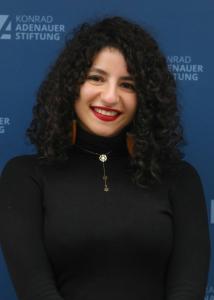As a result of the Russian war of aggression against Ukraine in 2022, the NATO gained renewed support in Europe and North America. States, like Sweden or Finland, want to join the alliance as well.
The NATO Academic Competition was initiated by the Arab Institute for Security Studies in cooperation with KAS in Jordan. The event aims to promote young leaders in various academic institutions and introduce them to NATO structures. During the NATO Academic Competition, participants presented their essays on the topic of NATO and its challenges in the MENA region. The eleven participants came from Palestine, Algeria, Iraq, Jordan, and Great Britian. The participants’ essays addressed the influence of development factors on NATO, past military interventions, NATO’s future strategy in the MENA region and security strategies, as well as topics such as cybersecurity, radicalization, nuclear threats, and settler violence against Palestinians.
After presenting the co-responsible persons, Dr. Ayman Khalil, the Romanian Ambassador George Cristian Maior, Dr. Ali Al-Yasiri and Dr. Edmund Ratka, the former Minister for European and Foreign Affairs of Malta, Dr. Evarist Bartolo, gave an opening speech. At the beginning he emphasized the special connection between his home country Malta and the MENA region. Malta feels strongly connected to countries in the Maghreb and others in the region. He also spoke about Malta’s special foreign policy position as a neutral state during various conflicts. Here he referred to Jordan’s similar stance. Due to this neutral position and Malta’s size, the country tends to try to mediate diplomatically in conflicts, like Jordan. He then called on politicians to make more of an effort to solve problems by listening to the opposing side with patience and trying to understand their point of view, instead of letting situations escalate too quickly. Dr. Evarist Bartolo went on saying that the unipolar world order under the leadership of Western states had come to an end and that we now find ourselves in a multipolar world in which China and regional powers are increasingly establishing themselves. He also mentioned that in this multipolar world, there should be equality between states and every state should be respected.
Dr. Evarist Bartolo’s speech was followed by two more panels in which the participants could present their essays. In the first panel, they presented their contributions on topics such as the influence of social problems, e.g. poverty, high infant mortality or reduced access to education, on the NATO alliance. Other contributions focused, e.g. on past NATO interventions in Kosovo, Afghanistan and Libya or the Alliance’s strategic concept for the MENA region and future opportunities for cooperation. Another contribution specifically addressed NATO’s strategy for the Arab Israeli conflict. During this panel, it was emphasized that security within the MENA region also plays a role in the security of the West. This should also be considered regarding the war in Gaza.
The last panel dealt with topics such as NATO and new threats from terrorism, combating it and threats from cyber activities. Future wars could also be fought on a ‘digital’ front. Signs of this can already be seen in Russia’s war of aggression against Ukraine. Another essay addressed a possible connection between radicalization and military interventions using the example of the Arab Israeli conflict. In this topic, it is important to look at the whole picture of the conflict with its historical roots. This is often forgotten by Western states, in contrast to states such as Jordan. Other essays focused on NATO’s nuclear strategy and how it has changed over the years. Furthermore, other contributions dealt with the different possibilities for NATO cooperation, e.g. joint combat training. The last essay dealt with Israel’s settlement policy and the associated problems.
After all participants had presented their essays, Fadel Kaseb, the moderator of the entire event, gave some closing remarks. It was emphasized that a distinction should be made between the NATO alliance and its individual member states when it comes to strategies and goals and that the human component should never be forgotten in decisions and strategies, regardless of ethnicity or religion. With this closing remarks the NATO Academic Competition ended. The Amman Security Colloquium followed the next day. The forum is a regional discussion platform on the topics of security, global problems, and conflict resolution.
The NATO Academic Competition and the Amman Security Colloquium are important formats in the dialog between NATO and the MENA region. The cooperation between ACSIS and KAS is also located in the same context, as events have taken place in a similar context in the past. Looking at the renewed escalation in the Arab Israeli conflict, these collaborations and dialog platforms are becoming more important. The change within the geopolitics showed that regional powers will gain more influence within the MENA-region and are able to further strengthen their position.


